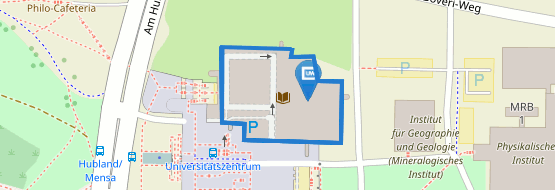How is academic literature created?
You need "academic" literature for your work, but what does this actually mean? You can find information on your topic in many places: in books, on the Internet or via official bodies such as the Federal Agency for Civic Education. However, not everything you find will be "academic".
Academic literature fulfils the following characteristics:
- Written by academics for the specialist community and therefore of a high professional standard, unlike publications written primarily for laypersons.
- Engages in a dialogue with statements made by other experts in order to advance the findings of the research area. Each additional publication aligns itself with the network of existing academic studies, refers to them, contradicts them or adds new findings. Therefore, academic works must refer to other sources and list them in the bibliography. It is important that your work also deals with the specialist literature on your subject and presents the current state of research.
- Statements made are verifiable and sound. The bibliography is an indispensable part of this. Many academic publications are independently reviewed by other researchers. This quality assurance procedure, mainly carried out in publishing houses, is known as peer review. If an article is labelled as "peer reviewed", it has withstood the most stringent quality checks.
Academic literature can be published in various ways. Most publications come from the relevant specialist publishers. However, many are also made freely accessible in a university’s online publication server.
A brief overview of the most common types of publication:
- Monograph: A monograph is a "book" written by one or more people that covers a topic comprehensively. In the academic world, monographs are primarily produced as final theses, i.e. as a PhD thesis or in the context of a postdoctoral qualification, or as "final publications" after years of research work in a particular field. Textbooks, which present an overview of a research topic for students, are also important.
- Anthologies (also conference volumes, anniversary publications, etc.): At first glance, an anthology looks just like a monograph. However, rather than being written by one or more persons, it brings together many contributions from different authors. If you look at an anthology’s table of contents, you will find various articles – usually on a specific topic – compiled by different authors. The person named on the cover of the book is the editor. They will have initiated the collection of articles and pushed the project forward.
- Journal articles or papers: The most recent research literature is published in articles in specialist journals. Before an academic (from the humanities, for example) completes a new monograph, they will publish the latest findings bit by bit long before the monograph itself is published. In the natural sciences, where monographs are much less important in publishing research results, journal articles are the relevant form of publication. In this field, the journal in which an article is published is very important, along with the result of the quality and peer review procedures.
- Working papers: In many subject areas, such as the social sciences, it is also standard practice to publish research results in advance. These working papers, which are usually published on the Internet, often appear again later as journal articles.
For this reason, you should check not just the monographs on your topic. In order to present and discuss the latest research literature in your work, you should also search for journal articles.
Monographs and anthologies can be found in our catalogue on the "Catalogues" tab. The titles of specialist journals are also listed there. If you know the journal in which an article was published, you can search for the title of the journal in the catalogue.
Articles from anthologies or journals are not listed under "Catalogues". You can search for articles via the catalogue in the "Articles & more" section, but it is much more effective to search a specialist database directly. All articles that have been published on a specific subject area will be listed there together.
In the following tutorials, we explain how searches work in the catalogue, in databases and on the internet.


